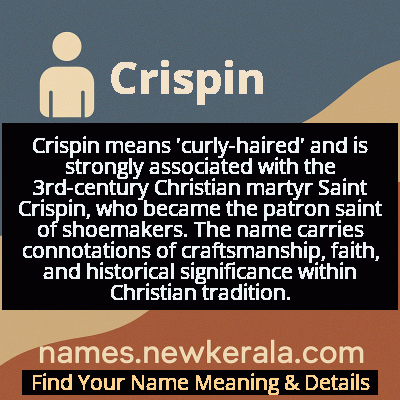Crispin Name Meaning & Details
Origin, Popularity, Numerology Analysis & Name Meaning of Crispin
Discover the origin, meaning, and cultural significance of the name CRISPIN. Delve into its historical roots and explore the lasting impact it has had on communities and traditions.
Name
Crispin
Gender
Male
Origin
Christian
Lucky Number
7
Meaning of the Name - Crispin
Crispin means 'curly-haired' and is strongly associated with the 3rd-century Christian martyr Saint Crispin, who became the patron saint of shoemakers. The name carries connotations of craftsmanship, faith, and historical significance within Christian tradition.
Crispin - Complete Numerology Analysis
Your Numerology Number
Based on Pythagorean Numerology System
Ruling Planet
Neptune (Ketu)
Positive Nature
Intuitive, analytical, spiritual, and inquisitive.
Negative Traits
Secretive, reserved, aloof, and can be overly critical.
Lucky Colours
Green, yellow.
Lucky Days
Monday.
Lucky Stones
Cat’s eye, moonstone.
Harmony Numbers
1, 5, 6.
Best Suited Professions
Scientists, researchers, spiritual leaders, detectives.
What People Like About You
Depth of knowledge, analytical skills, spirituality.
Famous People Named Crispin
Saint Crispin of Soissons
Christian Martyr
Patron saint of shoemakers martyred with his brother Crispinian in the 3rd century
Crispin Glover
Actor
Renowned character actor known for distinctive roles in film and avant-garde artistic projects
Crispin Bonham-Carter
Actor
Notable British stage and screen actor with extensive Shakespearean credentials
Crispin Wright
Philosopher
Leading contemporary philosopher in mathematics, language, and metaphysics
Name Variations & International Equivalents
Click on blue names to explore their detailed meanings. Gray names with will be available soon.
Cultural & Historical Significance
The name's cultural impact was dramatically amplified by William Shakespeare's 'Henry V', where the St. Crispin's Day Speech before the Battle of Agincourt transformed the name into a symbol of military brotherhood, national pride, and inspirational leadership. This literary connection ensured Crispin's enduring place in English-speaking cultural consciousness, making it a name that evokes both sacred martyrdom and secular heroism. The combination of religious significance and literary fame creates a unique cultural footprint that spans both spiritual and artistic domains.
Extended Personality Analysis
People named Crispin are typically associated with a blend of traditional values and creative expression. Their namesake's artisan background suggests personality traits of meticulous attention to detail, patience in craftsmanship, and pride in skilled work. The historical martyr connection indicates potential for strong moral convictions, resilience under pressure, and willingness to stand by principles. These individuals often display a quiet confidence rather than overt assertiveness, combined with the eloquence and leadership qualities reflected in the Shakespearean association.
In social contexts, Crispins tend to be perceived as reliable, thoughtful individuals who value deep connections over superficial relationships. Their creative inclinations often manifest in practical arts or intellectual pursuits rather than flamboyant expression. The 'curly-haired' etymology contributes to perceptions of approachability and distinctive character without being overly eccentric. Modern Crispins often balance respect for tradition with adaptive innovation, making them effective in roles that require both historical understanding and contemporary relevance. They typically excel in environments where dedication, precision, and principled conduct are valued.
Modern Usage & Popularity
In contemporary naming practices, Crispin occupies a distinctive niche as an uncommon but respected choice that appeals to parents seeking names with historical depth, literary connections, and Christian significance. While it has never ranked among the top names in English-speaking countries, it maintains consistent usage particularly in the United Kingdom, where its Shakespearean and saintly associations resonate strongly. The name has experienced mild revival in recent years as part of the vintage name trend, though it remains far less common than similar saint names like Sebastian or Benedict. Modern usage often reflects educated, middle-class families with appreciation for history and literature, and it's particularly favored in Catholic communities where saint names retain importance. The name's relative rarity gives it an air of distinction without being overly unusual, making it an attractive option for parents seeking something traditional yet uncommon.
Symbolic & Spiritual Meanings
Symbolically, Crispin represents a rich tapestry of meanings drawn from its historical, religious, and literary associations. Primarily, it symbolizes skilled craftsmanship and dedication to quality work, reflecting its patron saint's shoemaking profession as a metaphor for building foundations and supporting life's journeys. The martyrdom aspect adds layers of spiritual sacrifice, moral courage, and unwavering faith in principles. The Shakespearean connection brings symbolic weight of inspirational leadership, brotherhood in adversity, and the power of eloquent speech to motivate and unite.
Metaphorically, Crispin suggests someone who combines practical skills with spiritual depth—a bridge between earthly craftsmanship and higher ideals. The 'curly-haired' etymology contributes symbolic meanings of natural elegance, distinctive character, and approachable complexity. Overall, the name embodies the ideal of living one's faith through daily work, speaking truth with conviction, and maintaining personal integrity while contributing to community. It represents the synthesis of artisan tradition, spiritual commitment, and leadership excellence.

